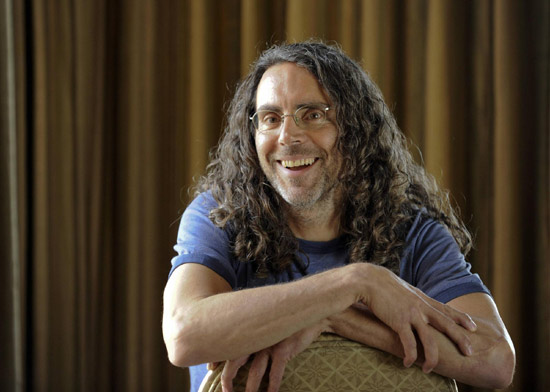Movies
Filmmaker Tom Shadyac: from 'Liar' to truth seeker
Updated: 2011-03-14 13:19
(Agencies)
|
 |
|
Director Tom Shadyac talks about his new project, a documentary "I Am" in Los Angeles March 7, 2011. Hollywood movie director Shadyac is best known for blockbuster comedies such as "Ace Ventura: Pet Detective," "Liar Liar," "The Nutty Professor" and "Bruce Almighty" among other films. But this Friday, Shadyac enters the world of documentary filmmaking with "I Am," which was inspired by a cycling accident that left him with Post Concussion Syndrome, in which symptoms of the concussion don't go away.[Photo/Agencies] |
Hollywood movie director Tom Shadyac is best known for blockbuster comedies such as "Ace Ventura: Pet Detective," "Liar Liar," "The Nutty Professor" and "Bruce Almighty" among other films.
But this Friday, Shadyac enters the world of documentary filmmaking with "I Am," which was inspired by a cycling accident that left him with Post Concussion Syndrome, in which symptoms of the concussion don't go away.
After facing death, Shadyac embarked on a quest for enlightenment, meeting with experts in science, philosophy and faith, among other areas. He spoke with the likes of David Suzuki, Noam Chomsky and Desmond Tutu, asking what's wrong with the world and what can people do to make it right.
The 52-year-old filmmaker, who sold his mansion and now lives in a mobile home community in Malibu, California, sat down with Reuters to talk about his personal transformation.
Q: Most filmmakers start off making low-budget independent films and graduate to big studio blockbusters. You're doing it backwards. Did your bike accident knock the sense into you, or out of you, for you to be doing this?
A: "It knocked me out of my head, but I think I called that into my life. I hit my head 'cause I had to get out of my head. What better way to get a person out of their head and into their heart than to make their head so filled with pain and noise? It dropped me into my heart. And that's why I did this movie because I faced my own death."
Q: What in your life did you feel needed changing?
A: "I looked at my life and how I was doing my own business. I was standing above and saying 'I'm more valuable, I'm the director, pay me more, give me more spoils.' That to me was break from the morality that I believe in."
Q: What do you believe in?
A: "We're all in this together. Nothing in nature takes more than it needs, yet I was participating in a system which valued the fact that I took as much as I possibly could."
Q: You are one of the reasons stars like Jim Carrey, Eddie Murphy and Steve Carrell are able to command high salaries because of the successful films you worked on together. Have any of them reached out to you since you began this journey?
A: "A lot of people didn't know that I had the accident. I was very isolated. Some people may have called, but I didn't call back. I couldn't even do a phone call. It was quite painful to even do that. So I don't blame them. They simply didn't know. And the film is only coming out now."
Q: If the bike accident led to this documentary, what led to the shift in your outlook and attitude?
A: "Morgan Freeman opened me up to all these ideas. After 'Bruce Almighty,' he shattered my paradigm by turning me on to certain authors. I came back to him and said, 'I'm seeing things differently now. What do I do?' He said, 'I have no idea, son.' I was like, 'Are you kidding me? You're going to shatter my paradigm and not give me a program?'"
Q: This coming from the man who played God in your movies.
A: "I'm so glad he did that, now, because I'm not doing anything just because Morgan Freeman told me to. Or because I read about a program that gave me five steps to follow on the Internet. (With this movie) I'm not telling anybody what to do. I've simply awakened to a principle I've found for myself."
Q: Do you consider yourself a Hollywood drop-out?
A: "I'm a drop-out in the sense that our society has taught us to accumulate as much as you can and then elevates that accumulation and says, 'Oh look at the winner. We're gonna visit his mansion today.' That was me -- living in a mansion I didn't need. That is what I'm dropping out of."
Q: So what's next for you?
A: "I may host a talk show about these very ideas. I was in dialogue for a while with the Oprah Winfrey Network about the ideas in this movie. We may revisit that."
Q: Any more movie making?
A: "I have a film already financed called 'Planetwalker.' It's the true story of John Francis, an African American gentleman that I talk to in the documentary. He gave up driving and speaking upon seeing an oil spill. He walked for 22 years and in silence for 17. It's an incredible story."
Q: How is your concussion? Are you 100 percent cured?
A: "I'm a good 95 percent. I still have challenges. When I travel on an airplane it can be too much stimuli. When I go into an abrasive environment, like a restaurant with cement floors and clanking plates, I can't take it. But if this is as good as it gets, I'm peachy."
E-paper

Factory fever
Despite auto manufacturing bubble scare, car giants gear up expansion of factories.
Preview of the coming issue
Dressed for success
Fabric of change
Specials

Earthquake Hits Japan
A massive 8.8 magnitude quake hit the northeast coast of Japan on March 11,2011.

NPC & CPPCC sessions
Lawmakers and political advisers gather in Beijing to discuss major issues.

Slide: Japan quake
Devastating earthquake and tsunami left millions without water, electricity, homes or heat.
